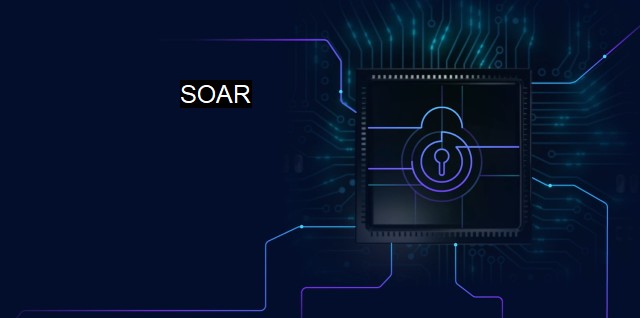What is SOAR?
SOAR: Streamlining Cyber Defense Strategies with Security Orchestration, Automation, and Response Technology
In the present era of digital dependence, where various business operations and day-to-day activities have migrated to the virtual domain, cybersecurity has emerged as a major concern. One of the widely accredited solutions in contemporary cybersecurity is Security Orchestration, Automation, and Response, also known as SOAR. With SOAR is a stack of compatible software solutions and tools designed to help organizations more efficiently manage and respond to the sheer volume of alerts and incidents they encounter daily.At its core, SOAR is all about leveraging data to make cybersecurity operations more efficient and effective. It is designed to assist security analysts and teams to triage, investigate, and respond to cyber threats faster and more accurately. Its fundamental objectives are to enhance the ability of security teams to identify and respond to threats, increase efficiency, improve response times, and reduce the repetition of low-level tasks by security teams.
SOAR is an amalgamation of three distinct yet interconnected elements. These are security orchestration and automation, security incident response platforms, and threat intelligence platforms. Security orchestration and automation involve the streamlining and automation of alert triaging, incident response, and various other security tasks. Security incident response platforms help in coordinating and managing the responses to cyber threats, while threat intelligence platforms gather data from various sources about potential security threats and aid in effectively managing such situations.
Working as one unit, these components help security teams streamline their workflows. SOAR allows companies to comprehensively collect threat-related data from a variety of sources and conduct detailed analyses for forensics and future threat prevention. these advanced analytical capabilities of SOAR software aid in creating more efficient security postures by suggesting predictive measures.
One of the most significant benefits of SOAR is its capacity to reduce the strain on human resources. Increasingly sophisticated threats, surging alert volumes, employee skill gaps, and budget constraints have added considerable pressure on cybersecurity departments. The implementation of SOAR can greatly relieve this pressure. With automated responses to recognized low-level threats, security professionals can dedicate their expertise and focus to higher priority issues rather than coping with repetitious tasks.
Another potential advantage of SOAR includes the reduction of mean time to respond (MTTR). That is, SOAR helps to decrease the interval between the initial detection of a threat and the mitigation of that threat. This decrease in MTTR precipitates improved overall security posture and a lessened possibility of the threat escalating into critical disruption.
On the other hand, despite its many advantages, the adoption of SOAR has its challenges. It requires an upskilling of employees and the reshuffling of traditional security operations centers (SOCs). Security analysts need training to handle and understand SOAR's intricate processes and technologies.
In an environment where cyber threat actors are becoming more sophisticated and persistent, SOAR technologies prove to be an essential tool. With their capabilities to automate, streamline and improve response times, they offer unique opportunities to Companies for maximizing their cybersecurity efforts. While adoption might come with challenges, with proper education, and gradual integration in the cybersecurity strategy, SOAR can vastly contribute to enhancing an organization's security posture. Therefore, the overall benefit outweighs the potential difficulties, and organizations should duly strive towards integrating and employing SOAR technologies to safeguard their digital assets.

SOAR FAQs
What is Soar in cybersecurity?
Soar stands for Security Orchestration, Automation and Response. It is a cybersecurity solution that uses automation and orchestration techniques to quickly detect, investigate, and respond to security incidents. By reducing manual tasks and accelerating the response time, Soar increases the effectiveness of security operations teams.How does Soar differ from traditional antivirus?
Unlike traditional antivirus, which relies on signature-based detection to identify known threats, Soar uses a variety of techniques, such as behavioral analysis and machine learning, to detect and respond to both known and unknown threats. Soar also automates the incident response process and integrates with other security tools, such as endpoint detection and response (EDR) and security information and event management (SIEM) solutions.What are the benefits of using Soar for cybersecurity?
The benefits of using Soar for cybersecurity include faster incident response times, improved efficiency of security operations teams, and increased accuracy of incident detection and response. Soar also provides a unified view of security incidents across the organization, enabling better collaboration between teams and reducing the risk of an incident slipping through the cracks.How does Soar help organizations with compliance?
Soar helps organizations with compliance by providing a centralized platform for managing security incidents and documenting incident response activities. This makes it easier to demonstrate compliance with regulations and standards, such as the General Data Protection Regulation (GDPR) and the Payment Card Industry Data Security Standard (PCI DSS). Soar also helps organizations maintain a consistent and repeatable incident response process, which is a requirement for many compliance frameworks.| | A | | | B | | | C | | | D | | | E | | | F | | | G | | | H | | | I | | | J | | | K | | | L | | | M | |
| | N | | | O | | | P | | | Q | | | R | | | S | | | T | | | U | | | V | | | W | | | X | | | Y | | | Z | |
| | 1 | | | 2 | | | 3 | | | 4 | | | 7 | | | 8 | | |||||||